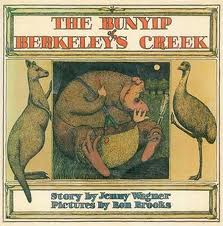One of my favourite Australian stories is a children’s book called The Bunyip of Berkley’s Creek. It tells the story of a bunyip, a mythical creature from aboriginal folklore which emerges from a billabong (swampy lake) and sets out on a journey of discovery.
Who am I the bunyip asks those he meets. Now it is a long time since I read the book but here is what I think the responses where. A duck says the platypus as he looks at the bunyip’s huge webbed feet. Ugly says the kangaroo when he catches a glimpse of the bunyip’s grotesque face. You don’t exist at all says the scientist ignoring the mythical creature in front of him. Tired and dispirited the bunyip returns to the billabong alone. Then as he watches another creature emerges from its depths. Who am I? it asks. You’re a bunyip responds the delighted first bunyip and you look just like me.
All of God’s creatures, even the mythical ones need a sense of where they come from and where they belong. I was very aware of this last month as I spent time with my family in Australia. This was my first trip since my mother died last year and I was not quite sure how I now belonged to this family I hardly ever saw.
As you can imagine much of our time was spent reminiscing, sharing stories not just about our childhood but about our ancestors.
My father was Greek but it is probable that my maiden name Aroney is a rendition of Aaron. Perhaps way back we have Jewish blood in us. My ancestors migrated to Constantinople, then to Spain and finally to the island of Kythera off the southern coast of Greece. In the early 1900s many headed for Australia. Blue eyed Greeks, maybe mixed with Viking blood, no one is sure, but we all wonder and speculate. We want to know where we come from. We want to know where we belong.
My mother’s family is harder to trace. Her parents migrated from Scotland in the early 1900s, her mother from Aberdeen, her father from Keith. Her maiden name was Milne, a common Scottish name and her Dad’s family probably goes back a long way in Scotland. But Mum’s mother’s name was Cato. Is it Spanish? Again no one knows but we can speculate. Her family was part of the aristocracy and the Scottish nobility had close ties to the Spanish Court.
These discussions have been very important for me. They have assured me that I will always belong to this family, not just the present generation, but all those who have gone before too. This provides a sense of rootedness, an anchor for my soul.
As a follower of Jesus however, I know that the sense of identity I gain from my biological family is not enough. My identity is now rooted in being a child of God and my sense of belonging is tied to my true home in the kingdom of God.
Becoming a Christian asks all of us to take on a new identity and a new place of belonging. It challenges us to be reshaped according to a different culture. Old priorities are turned upside down and we enter a process of unlearning, learning and relearning. The kingdom of God culture of love, generosity, compassion and mutual care, transcends the cultures in which we grew up and from which we draw our stories. Living into this culture is meant to anchor us in ways that the stories of our birth families never can.
So my question for all of us today is: Where do we feel we belong?


2 comments
“Our hearts are restless, until they rest in Thee.”
The earth is not our home. Whatever or where ever we feel at home is but a foretaste, a hint, of our True Home in Heaven.
Amen to that